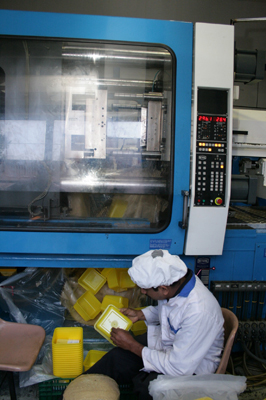
Phoenix rises in the plastic industry
Take a minute to think of all the times you use plastic during your average day. It’s either a toothbrush or a plastic plate or an easy chair to relax in. Less obvious, is the TV blaring in the background or the radio on throughout the day or even the microwave heating the food. Plastic has become almost indispensable. The Sunday Times FT recently visited the production facilities of Phoenix Industries, manufacturers of plastic products, at Ragama and Pannala near Minuwangoda to get a further insight into this fascinating industry. “Without realizing it, we (the public) are in touch with plastic more than 50% of the time,” were the words of Rohan Wijekoon, Phoenix’s General Manager - Sales. Process Plastic production is an interesting process. Tiny pellets of clear plastic are mixed in with another type of pellets to insert rigidity along with pellets of colorant, the ratios depending on the desired hues. The mixture is then shot through a tube which heats and melts it. There are two methods to it. In Injection Moulding, the ‘liquid’ is injected into a custom-made mould, one that often costs close to Rs. 20-25 million worth of investment. In Blow Moulding, the malleable plastic comes out in a tube which is then clamped by a mould. Hot air is then ‘blown’ in to inflate it. An essential part of the process is the testing for quality. For example, to check the user-worthiness of a chair, four tests are carried out: The Load Test consists of keeping a 125kg weight on a random sample of chairs for 24 hours. In the vibration test, 125kg is kept on the chair and manually shaken for 45 seconds. For the Colour-fading Test, chairs are allowed to bake in the sun for 21 days. The most interesting test however, is the Impact Test, where the sample of chairs is dropped from a height of 12 feet, for no less than 50 times.
Phoenix produces a variety of plastic products like buckets, crates and toothbrushes. It also specializes in packaging for a number of clients including Pepsi, Elephant House, Cargills and Caltex. The CEO Hasith Prematillake explained that generally the company gives in its requirements, and according to them Phoenix designs the packaging. Plastic = Pollution? Safe recycling Phoenix does not produce small food grade items like plates, forks and spoons for this major reason. They find it impossible to compete with the cottage industries who produce them using recycled material and sell at far lower prices. However, according to the CEO, Sri Lanka will be adopting the Hazard Analysis and Critical Control Points (HACCP) procedures from April 2008, which enforces minimal requirements on the quality of food-grade items. Phoenix will then be at the top of the game since they already comply with those requirements.
Not even the plastic industry has been able to escape the clutches of the cost of living monster. Ideally, with consumer trends bending towards the increased use of plastic, the volume of sales of the firms should rise. In reality, plastic is a secondary market. With the prices of basic items going up, people have begun to demand less plastic-packaged goods like shampoo, detergent and even engine oil. Phoenix revenues have been increasing but Prematillake says that “There is no real growth” and that the massive investments required to keep the company afloat are a huge risk. Investment-wise however, Phoenix has not been stingy. Currently they are in the process of moving their plant in Ragama to the one at the Makandura Industrial Zone at Pannala. The new plant is an investment of almost Rs. 1 billion. The machines used cost on average Rs. 20- 25 million. Still, “We are ready to invest in any kind of new technology,” says Wijekoon from Sales, explaining that the Phoenix team gathers its technical expertise mainly from its global travels. Challenges Production has also been plagued by high oil and electricity prices and lack of infrastructure. As the third largest player in the market however, Phoenix is holding its own. The New Year will see Phoenix restructuring its operations to manage costs better and increase its internal efficiency for higher growth. |
|
||
| || Front
Page | News
| Editorial
| Columns
| Sports
| Plus
| Financial
Times | International
| Mirror
| TV
Times | Funday Times || |
| |
Reproduction of articles permitted when used without any alterations to contents and the source. |
© Copyright
2008 | Wijeya
Newspapers Ltd.Colombo. Sri Lanka. All Rights Reserved. |


